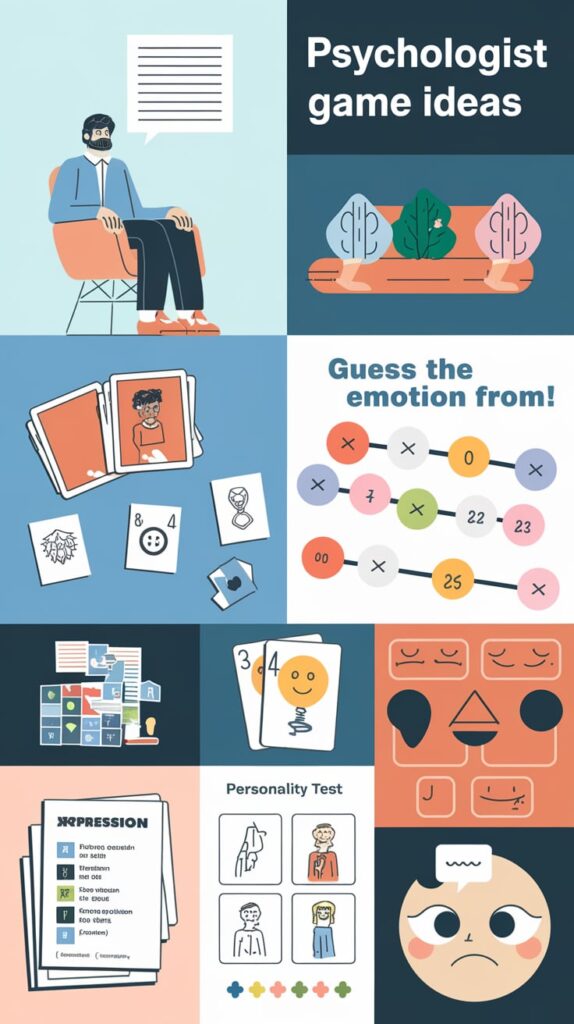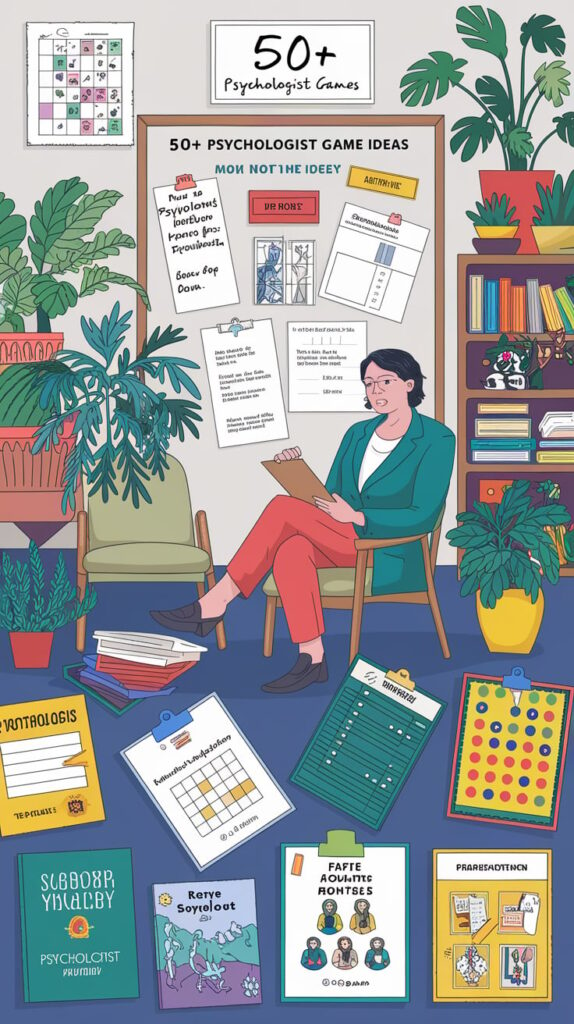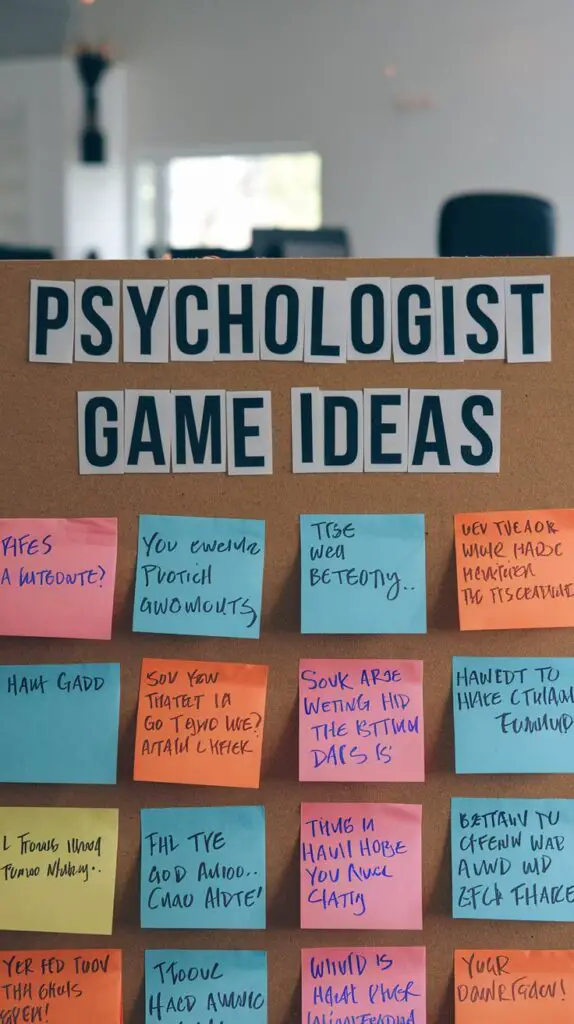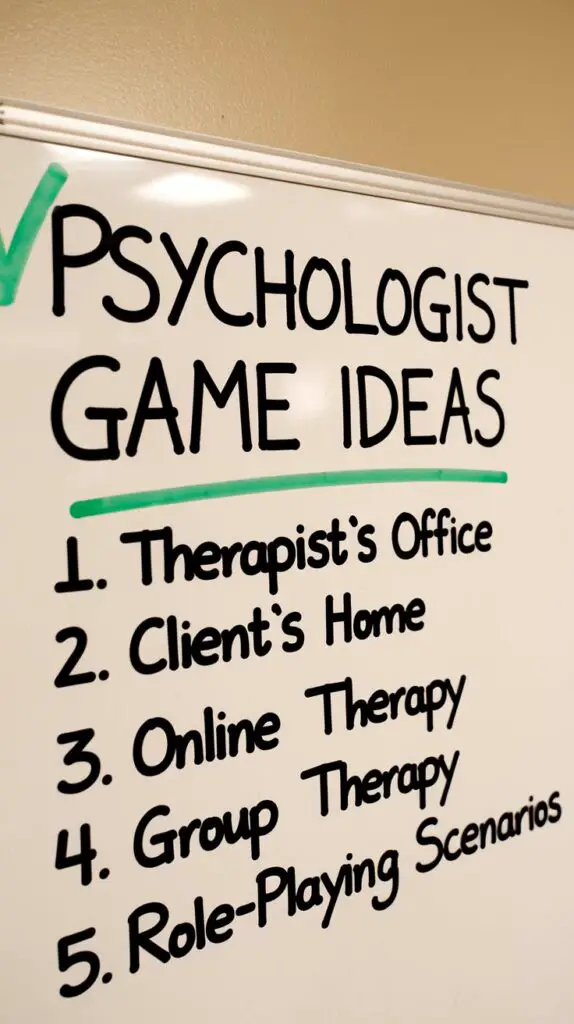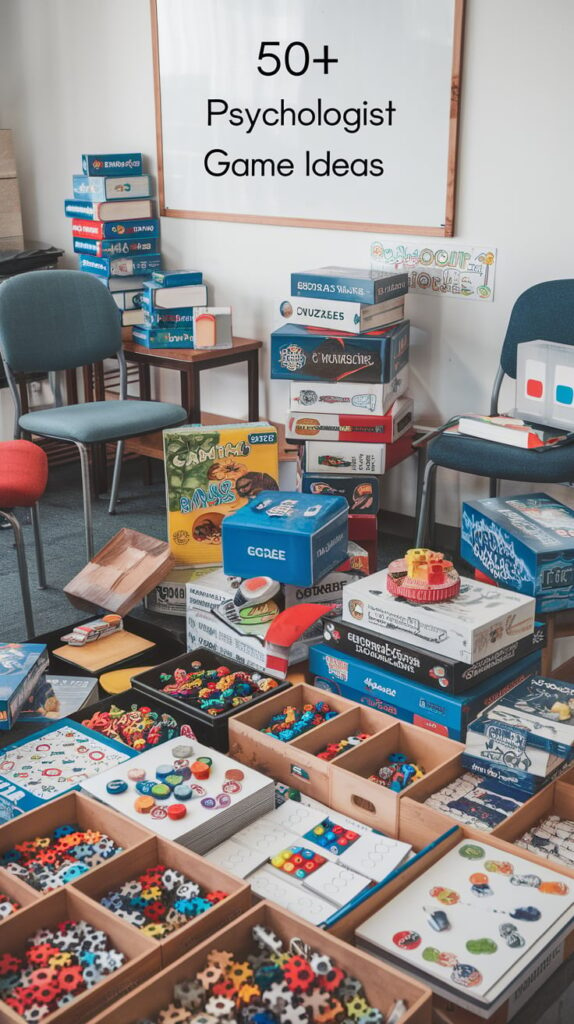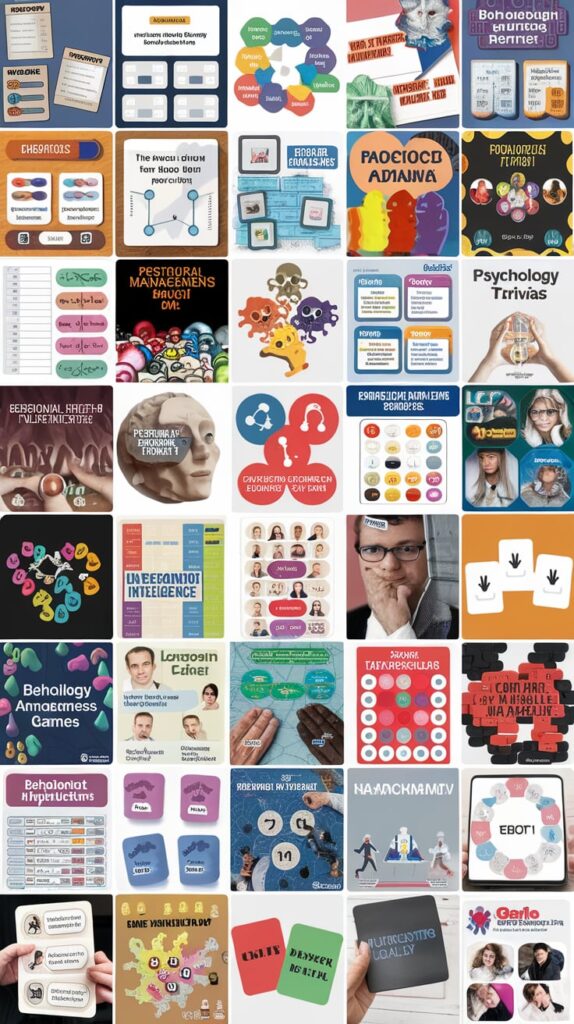Psychologist Game Ideas – Psychologist games are engaging, interactive activities that encourage participants to step outside their usual behaviors and adopt new roles or perspectives. These games are designed to stimulate creativity, improve communication skills, and enhance emotional intelligence. By taking on various personas or using unique ways of speaking or acting, participants learn to think quickly, adapt to different situations, and understand others’ viewpoints. Examples include acting like a different animal, speaking in a foreign accent, or pretending to be a famous personality.
These games help break down social barriers, foster empathy, and promote spontaneous interaction, all while adding an element of fun. They are particularly useful in team-building, group therapy, icebreakers, or simply as a fun way to engage with others in a relaxed setting. The overall goal is to facilitate self-expression, improve group dynamics, and create a playful atmosphere for personal and social growth.
Psychologist Game Ideas
Here is a list of 100+ Psychologist Game Ideas that can be used for engaging activities related to psychology or therapeutic sessions:
- Two Truths and a Lie
- Charades
- Feelings Bingo
- Word Association
- Rorschach Inkblot
- Emotion Wheel
- The Mirror Game
- Storytelling Round
- Personality Quiz
- Therapeutic Journaling
- Therapy Role-Playing
- Emotion Charades
- Guess the Emotion
- The Life Timeline
- Therapist Hot Seat
- Cognitive Behavioral Scenarios
- Reframing Thoughts
- Cognitive Restructuring
- Emotion Sorting
- Mindfulness Meditation Game
- Memory Recall
- Personal Strengths Inventory
- Deep Breathing Game
- The Compliment Game
- Improv Role-Play
- The Self-Esteem Quiz
- Coping Strategies Brainstorm
- Therapeutic Board Game
- Stress Ball Toss
- Guided Visualization Exercise
- Picture the Future Game
- Animal Personality Game
- What Would You Do?
- The Gratitude Journal
- The Body Scan Game
- Color and Mood Association
- Focus and Concentration Exercise
- Personality Color Test
- Mirror Image Game
- The “Who Am I?” Game
- Affirmation Challenge
- Therapy Skills Role-Play
- Unsent Letter Activity
- Perception Challenge
- Emotional Timeline Exercise
- Group Therapy Word Cloud
- Therapist Role Reversal
- The “Unlikely Friendship” Game
- Behavioral Activation Exercise
- The Comfort Object Game
- Coping Mechanism Card Game
- Personal Growth Timeline
- Cognitive Dissonance Experiment
- Self-Care Bingo
- Exploring Cognitive Distortions
- Team Building through Therapy
- Exploring Empathy Game
- Therapeutic Writing Prompts
- Future Vision Mapping
- Personal Reflection Journaling
- Social Skills Role-Play
- Group Therapy Discussions
- Perspective-Taking Exercise
- Therapy Word Search
- Behavioral Observation Game
- The “Stress Bucket” Exercise
- Conflict Resolution Role-Play
- Goal Setting Card Game
- Reframing Negative Thoughts
- Therapy Visualization Game
- Deep Breathing and Counting Game
- Mindfulness in Motion
- Positive Affirmations Challenge
- Desensitization Game
- Grounding Techniques Exercise
- Memory and Recall Exercise
- Challenge Negative Self-Talk
- Self-Care Scavenger Hunt
- Gratitude Circle
- The “What Would You Tell Your Younger Self?” Game
- Handling Anxiety Game
- Mindful Eating Exercise
- Life Stressor Identification
- Self-Compassion Circle
- Cognitive Bias Test
- Social Anxiety Role-Play
- Therapeutic Memory Game
- Therapeutic Art Expression
- The “Gratitude Rock” Game
- Coping with Loss Activity
- Problem-Solving Scenarios
- Meditation and Relaxation Challenge
- Therapy Feedback Exchange
- The “Forgiveness” Activity
- Visualization for Goal Achievement
- Post-Traumatic Growth Exercise
- Affirmation Mirror Game
- Self-Awareness Bingo
- Psychological Word Match
- Peer Support Storytelling
- Character Strengths Exploration
- Behavioral Reflection Activity
- The Empathy Swap
- Therapy Skills Memory Game
- Acceptance and Commitment Exercise
- The Therapeutic Circle of Support
- Psychological Safety Discussion
- Psychological Fantasy Visualization
- Mindful Walking Exercise
- Anger Management Role-Play
- Emotion Wheel and Reflection
- Expressive Writing for Stress Relief
- The “What-If” Thinking Game
- Building Confidence Role-Play
- The Perspective-Taking Challenge
- Distraction Techniques Exercise
- Cognitive Shifting Exercise
- Stress Relief Guided Imagery
- The “Journey” Visualization
- Building Resilience through Challenges
- Problem-Solving Decision Tree
- Dream Analysis Activity
- Therapist Empathy Challenge
- Relaxation Techniques Showdown
- Coping with Change Activity
- Therapeutic Impact Discussion
- Grief and Healing Circle
- Self-Reflection through Art
- Therapy Feedback Questions
- Behavioral Tracking System
- Resilience Building Exercise
- Breaking Unhelpful Habits
- Navigating Conflict Through Therapy
- Therapeutic Vision Board
- The “Values” Exploration Game
- Cognitive Rehearsal for Anxiety
- The “Walk a Mile” Empathy Challenge
- Role Reversal for Conflict Resolution
- Therapist Self-Care Check-In
- Exploring Different Perspectives Activity
- Mental Health Journaling Prompts
- Guided Mindfulness Breathing Game
- The “Reframe Your Day” Exercise
- Empathy Building in Conversations
- Navigating Uncertainty Game
- Acceptance Challenge in Therapy
- Goal-Oriented Therapy Planning
- Positive Reinforcement Game
- Savoring Positive Moments
- The “Therapist’s Journal” Exercise
These activities can be used by psychologists, therapists, or anyone interested in engaging individuals or groups in therapeutic or reflective activities.
How to play
1. Two Truths and a Lie
How to Play:
- Each participant writes or shares two true statements and one false statement about themselves.
- Others guess which is the lie.
- Rotate turns until everyone has participated.
Benefits:
- Builds trust and rapport in a group setting.
- Encourages self-disclosure and active listening.
- Enhances social and deductive reasoning skills.
2. Charades
How to Play:
- Write emotions, activities, or concepts on slips of paper.
- Players act out the word or phrase without speaking.
- Others guess within a time limit.
Benefits:
- Enhances nonverbal communication skills.
- Encourages creativity and teamwork.
- Improves emotional expression and empathy.
3. Feelings Bingo
How to Play:
- Create bingo cards with emotions or coping strategies instead of numbers.
- The facilitator calls out emotions or scenarios, and players mark matching squares.
- The first to get a bingo wins.
Benefits:
- Helps identify and understand emotions.
- Encourages discussions about coping mechanisms.
- Improves emotional literacy.
4. Word Association
How to Play:
- Start with a word (e.g., “happiness”).
- Each player quickly says the first word that comes to mind related to the last word.
- Continue until a player hesitates or repeats.
Benefits:
- Enhances creativity and quick thinking.
- Encourages exploration of subconscious connections.
- Can reveal emotional associations.
5. Rorschach Inkblot
How to Play:
- Show inkblot images and ask players what they see.
- Discuss interpretations to understand perceptions and emotions.
Benefits:
- Encourages introspection and self-expression.
- Aids in identifying underlying thoughts and feelings.
- Fosters creativity and abstract thinking.
6. Emotion Wheel
How to Play:
- Present an emotion wheel chart with primary and secondary emotions.
- Players select emotions they’re currently feeling and discuss why.
Benefits:
- Promotes emotional awareness and vocabulary.
- Encourages sharing in a safe environment.
- Builds empathy and understanding in group settings.
7. The Mirror Game
How to Play:
- Pair players and have one act as the “mirror,” mimicking the other’s movements.
- Rotate roles after a set time.
Benefits:
- Builds trust and connection.
- Enhances focus and nonverbal communication.
- Promotes mindfulness and presence.
8. Storytelling Round
How to Play:
- Start a story with one sentence.
- Each player adds a sentence to continue the narrative.
- Conclude when everyone has contributed.
Benefits:
- Encourages collaboration and creativity.
- Enhances listening and improvisation skills.
- Builds a sense of community and shared experience.
9. Personality Quiz
How to Play:
- Use or create a personality quiz with questions about preferences and behaviors.
- Players share results and reflect on their personality traits.
Benefits:
- Encourages self-awareness and understanding.
- Highlights differences and commonalities among participants.
- Fosters introspection and self-acceptance.
10. Therapeutic Journaling
How to Play:
- Provide prompts like “What makes you happy?” or “Describe a challenging moment and how you overcame it.”
- Players write responses privately, then share if they’re comfortable.
Benefits:
- Promotes emotional processing and insight.
- Enhances writing and reflection skills.
- Can serve as a stress-relief activity.
11. Emotion Charades
How to Play:
- Write emotions on cards.
- Players act out the emotion while others guess.
Benefits:
- Develops emotional expression and recognition.
- Encourages empathy and teamwork.
- Fun and engaging way to explore feelings.
12. Mindfulness Meditation Game
How to Play:
- Lead a short guided meditation focusing on breathing or body awareness.
- Afterward, ask participants to share one thing they noticed.
Benefits:
- Reduces stress and increases focus.
- Promotes relaxation and mindfulness.
- Teaches grounding techniques.
13. Guess the Emotion
How to Play:
- One player chooses an emotion and expresses it through facial expressions or body language.
- Other players guess the emotion.
- Rotate until everyone has had a turn.
Benefits:
- Enhances emotional recognition and empathy.
- Encourages self-expression.
- Develops nonverbal communication skills.
14. The Life Timeline
How to Play:
- Provide players with a large sheet of paper and markers.
- Ask them to draw a timeline marking significant life events.
- Facilitate a discussion about what they learned from those events.
Benefits:
- Encourages reflection and self-awareness.
- Promotes sharing personal stories in a safe environment.
- Helps identify patterns and growth over time.
15. Therapist Hot Seat
How to Play:
- One player sits in the “hot seat” as the therapist.
- Other players role-play clients with different challenges or emotions.
- Rotate roles and discuss approaches.
Benefits:
- Builds problem-solving and empathy skills.
- Enhances understanding of therapeutic techniques.
- Encourages role reversal for deeper insight.
16. Cognitive Behavioral Scenarios
How to Play:
- Present a scenario (e.g., “You didn’t get a job you wanted”).
- Ask players to identify automatic thoughts and reframe them positively.
Benefits:
- Teaches cognitive reframing techniques.
- Develops problem-solving and emotional regulation skills.
- Encourages healthier thinking patterns.
17. Reframing Thoughts
How to Play:
- Write negative thoughts on cards (e.g., “I can’t do this”).
- Players pick a card and reframe the thought positively (e.g., “I’ll try my best”).
Benefits:
- Encourages positive thinking.
- Reduces self-doubt and negative self-talk.
- Teaches cognitive-behavioral strategies.
18. The Compliment Game
How to Play:
- Players take turns giving a genuine compliment to another participant.
- Discuss how receiving and giving compliments feels.
Benefits:
- Boosts self-esteem and positive relationships.
- Promotes a culture of kindness.
- Improves communication and confidence.
19. Improv Role-Play
How to Play:
- Players are given scenarios requiring quick thinking (e.g., “You’re meeting someone for the first time”).
- Role-play the interaction and debrief afterward.
Benefits:
- Enhances social skills and adaptability.
- Encourages creativity and confidence.
- Develops empathy and perspective-taking.
20. Coping Strategies Brainstorm
How to Play:
- Group brainstorms ways to cope with stress or challenging emotions.
- Create a shared list and discuss how to implement them.
Benefits:
- Builds a toolkit of practical coping strategies.
- Promotes collaboration and shared learning.
- Encourages proactive mental health management.
21. Therapeutic Board Game
How to Play:
- Use a game like The Ungame or create one with prompts focused on emotions and personal growth.
- Players take turns answering prompts and reflecting.
Benefits:
- Makes therapy concepts engaging and fun.
- Encourages open dialogue in a relaxed setting.
- Promotes emotional awareness and connection.
22. Stress Ball Toss
How to Play:
- Toss a stress ball around a circle.
- The catcher shares one thing that stresses them and how they cope.
Benefits:
- Encourages sharing and stress relief.
- Promotes active listening and mutual support.
- Provides a physical outlet for stress.
23. Guided Visualization Exercise
How to Play:
- Lead participants through a calming scenario (e.g., walking on a beach).
- Afterward, discuss their experience and feelings.
Benefits:
- Reduces stress and promotes relaxation.
- Enhances imagination and mindfulness.
- Teaches grounding techniques.
24. Picture the Future Game
How to Play:
- Ask participants to draw or describe their ideal future.
- Share and discuss the steps to achieve those goals.
Benefits:
- Encourages goal setting and optimism.
- Promotes self-awareness and planning.
- Helps visualize and work toward aspirations.
25. The Gratitude Journal
How to Play:
- Provide journals and ask players to list three things they’re grateful for daily.
- Share reflections weekly in a group setting.
Benefits:
- Improves mood and reduces stress.
- Encourages a positive outlook.
- Builds a habit of gratitude and appreciation.

